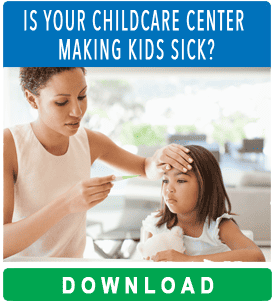Infection prevention isn’t always easy, especially in a day care setting. Children have naturally weaker immune systems, and they get sick more often than adults. In an environment where everyone is sharing toys, your child is bound to get sick at day care every once in a while. On the other hand, there are things you can do to reduce the number of infections your child gets each year. Here’s what you need to know:
1. Good Health Starts With Good Cleaning
It’s especially important to practice good cleaning of child care spaces, because many children are playing with the same toys and using school utensils. Good day care cleaning habits can help prevent the spread of harmful bacteria, viruses, and other germs. When choosing a day care center:
- Ensure that the center has a hand-washing procedure in place and that staff members teach and enforce good hygiene.
- Ask about the toy cleaning policy and if toys get a wipe-down each day. Ask how they disinfect toys to prevent germs.
- Inquire about diaper changing procedures. Day care workers should wear gloves and change the children in a separate diapering area.
- Ask about the sick child policy. Most day care centers have them, but some are more lenient than others. Choose a day care that does not allow entry if a child has a cold, diarrhea, vomiting, a sore throat, pink eye, or a fever more than 101 degrees Fahrenheit.
2. Prevent Skin Infections
Bacterial skin infections are some of the most annoying afflictions found in a day care setting. Impetigo, or “school sores” are highly contagious bacteria that form sores that crust and scab over. They can be itchy, and children scratch the sores and spread the bacteria to others. MRSA, or antibiotic-resistant staph, is another skin infection that can be painful and difficult to treat. To prevent MRSA, impetigo, and other skin infections, ensure that your day care center is routinely cleaning surfaces with a strong disinfectant, particularly one capable of cleaning MRSA. If your child comes home with a scrape or open wound, apply antibiotic ointment liberally and keep the area covered until it heals.
3. Encourage a Healthy Lifestyle
Your toddler or preschooler’s immune system may be underdeveloped, but there are still things you can to do reduce your child’s risk of infection. At this age, children require between 10 and 12 hours of sleep each day. Enforce an early bedtime and ensure your little one is getting adequate rest. Additionally, your child should be eating a diet rich in fruits, vegetables, and whole grains. Skip sugar-laden beverages and have your day care center offer water or milk only. Last, if your day care center does not offer well-balanced meals, consider packing healthier alternatives.
Keeping your child healthy at day care may seem like a challenge. However, it’s possible to limit the number of infections your child gets each cold and flu season. By choosing a day care center with good hygiene policies and taking charge of your children’s healthy lifestyle, you can effectively limit their risk of becoming ill. Follow these tips for a safe and healthy winter.
Additional Resources:
https://apic.org/Resource_/TinyMceFileManager/for_consumers/IPandYou_Bulletin_Early_childhood_centers.pdf
https://www.wikihow.mom/Avoid-Daycare-Germs
https://www.babycenter.com/0_how-to-keep-your-preschooler-healthy-this-winter_66483.bc
https://www.careforkids.com.au/child-care-articles/article/71/keeping-your-child-healthy-in-child-care
https://medlineplus.gov/ency/article/001974.htm




